Does your brand focus on products for glowing, radiant skin? In a crowded cosmetics market, it’s crucial to stand out.
Our extensive research and expertise in dermatology have uniquely positioned us as thought leaders in the realm of skincare.
This article promises to unveil the 10 key ingredients that can effectively illuminate the skin, positioning your brand at the forefront of skin brightening solutions.
In this journey to unlock radiant skin, here are the top 2 effective ingredients for brightening the skin:
Eager to discover the remaining ingredients that can revolutionize your skincare offerings?
Read on!
1. Vitamin C
Vitamin C, also known as ascorbic acid, is a water-soluble vitamin that is naturally found in various foods and also available as a dietary supplement. In the context of skincare, it’s highly revered for its antioxidant properties. It works by neutralizing free radicals, thereby reducing oxidative stress on the skin.

Benefits:
- Anti-Aging: Vitamin C promotes collagen synthesis, which is vital for skin elasticity. The increased collagen helps reduce fine lines and wrinkles, offering a youthful appearance.
- Brightening: It inhibits the enzyme tyrosinase, responsible for melanin production. By reducing melanin, vitamin C helps to fade pigmentation, improve skin tone, and enhance overall brightness.
- Sun Damage Repair: Vitamin C can neutralize free radicals caused by sun exposure. This can mitigate some of the damaging effects of UV radiation, although it’s not a substitute for sunscreen.
- Healing Properties: The vitamin accelerates the body’s natural wound-healing processes. This means it helps to heal minor cuts, acne scars, or minor burns more quickly.

Side Effects:
- Although it protects against UV damage, vitamin C can also make the skin more susceptible to the sun, necessitating the use of sunscreen.
- Some vitamin C serums can stain the skin, leaving a yellowish tint that usually washes off with water and soap.
Vitamin C is a versatile ingredient with a range of benefits that make it indispensable in the skincare industry. Having a thorough understanding of this ingredient will guide you in formulating products that are safe for diverse skin types.
2. Niacinamide
Niacinamide, also known as Vitamin B3, is a water-soluble vitamin that works with the natural substances in your skin to help visibly improve enlarged pores, uneven skin tone, and fine lines. It is incredibly versatile and suits a variety of skincare formulations. Beyond brightening, it has benefits that touch on multiple aspects of skin health.

Benefits:
- Sebum Regulation: Niacinamide can balance oil production in your skin, making it highly beneficial for both oily and dry skin types. Proper sebum regulation can lead to fewer acne breakouts.
- Reduction of Hyperpigmentation: Like Vitamin C, niacinamide also inhibits the enzyme responsible for melanin production, helping to lighten dark spots and improve skin tone.
- Barrier Strengthening: It helps in the production of ceramides, lipid molecules that contribute to a stronger skin barrier. A robust skin barrier can protect against environmental pollutants and moisture loss.
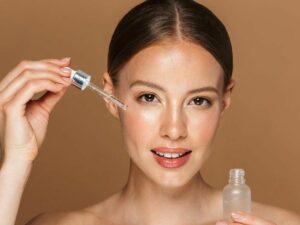
Side Effects:
- Though generally well-tolerated, some people may experience skin irritation, redness, or a burning sensation when using niacinamide.
- High concentrations can sometimes lead to skin flushing, particularly when used in combination with other active ingredients like AHAs.
As you consider integrating niacinamide into your product line, understanding its full spectrum of advantages and possible side effects is crucial for effective formulation.
3. Alpha Hydroxy Acids (AHAs)
Alpha Hydroxy Acids, commonly known as AHAs, are a class of chemical compounds often derived from natural substances like sugar cane, milk, and grapes. In skincare, they are used primarily as exfoliants to break down dead skin cells and reveal a new layer of skin. AHAs work by loosening the glue-like substance that holds dead skin cells to the surface, making it easier to remove them.
Benefits:
- Improved Skin Texture: AHAs can effectively remove dead skin cells, leading to smoother skin. Nako Cosmetics often incorporate these active ingredients to help users achieve that sought-after radiant glow.
- Acne Control: By exfoliating the skin and unclogging pores, AHAs can reduce the severity of acne and prevent future breakouts. This is especially beneficial in formulations targeted toward acne-prone skin.
- Hyperpigmentation Reduction: AHAs can reduce signs of hyperpigmentation, age spots, and discoloration by accelerating the skin’s natural shedding process. This leads to quicker regeneration of new skin cells, evening out the skin tone.

Side Effects:
- Overuse can lead to skin dryness and peel off the natural oils along with dead skin cells.
- May cause skin irritation, including redness and a burning sensation, particularly for those with sensitive skin.
Incorporating AHAs into your skincare brand can offer a wide range of benefits, but it’s crucial to understand the potential side effects to create balanced and effective formulations.
4. Hyaluronic Acid
Hyaluronic acid is a naturally occurring substance in the skin, known for its stunning capacity to attract and hold onto 1000x its weight in moisture. It works by pulling moisture from the air and deeper layers of skin to hydrate the surface. In skincare formulations, it’s commonly used as a powerful hydrating and moisturizing ingredient.

Benefits:
- Intense Hydration: One of the key benefits of hyaluronic acid is its ability to keep skin hydrated and balanced. It’s especially effective for tackling dryness and delivering a burst of moisture to the skin.
- Anti-Aging Properties: Hyaluronic acid helps to fill in fine lines and wrinkles temporarily. With its moisturizing properties, for example, it can make the skin appear plumper, reducing the visible signs of aging.
- Enhanced Skin Repair: It supports the skin’s healing and repairing ability by giving skin-smoothing moisture and contributing to the maintenance of the skin barrier, which aids in blocking external aggressors.

Side Effects:
- Some individuals might experience redness or itching, although this is uncommon and generally mild.
- When used as an injectable filler, hyaluronic acid may cause temporary bumps under the skin.
Hyaluronic acid offers numerous advantages for skincare formulations, making it a valuable addition to products aiming for hydrating and anti-aging benefits.
5. Kojic Acid
Kojic acid is a naturally occurring compound derived from fungi, commonly used in the skincare industry for its skin-lightening properties. It works by inhibiting the function of tyrosinase, the enzyme responsible for melanin production, which is the pigment that gives skin its color. Because of its ability to limit melanin, it is often included in formulations aimed at treating hyperpigmentation and uneven skin tone.
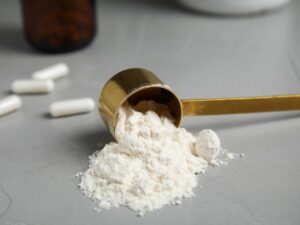
Benefits:
- Skin Brightening: According to Medical News Today, kojic acid is highly effective for reducing melanin production. Regular use can result in a more even and brighter skin tone, making it a vital ingredient in skin-brightening products.
- Antioxidant Properties: Besides its skin-lightening capabilities, kojic acid also contains antioxidant properties. It can help fight oxidative stress, thereby offering a protective mechanism against environmental damage.
- Anti-Microbial: Kojic acid has the added benefit of being anti-microbial. This makes it effective in combating acne and providing a clearer complexion by reducing bacterial proliferation on the skin.

Side Effects:
- Though rare, some people may experience an allergic reaction to kojic acid, manifesting as redness, itching, or even dermatitis.
- The ingredient may increase the skin’s sensitivity to the sun, making diligent sun protection even more essential.
Including kojic acid in your skincare formulations can provide a multifaceted approach to skin concerns like hyperpigmentation and acne.
6. Licorice Root Extract
Licorice root extract is a natural ingredient derived from the roots of the Glycyrrhiza glabra plant. It has recently gained popularity in skincare due to its versatile benefits. It contains active compounds like glabridin and liquiritin, which have anti-inflammatory, antioxidant, and skin-lightening properties.

Benefits:
- Skin Brightening: Licorice root extract can help diminish the appearance of dark spots and hyperpigmentation. For example, its active compound glabridin inhibits tyrosinase, the enzyme responsible for melanin production, making the skin look more even-toned.
- Anti-Inflammatory: The extract is often used in products aimed at calming the skin. It can help reduce redness and irritation, making it beneficial for conditions like rosacea and sensitive skin.
- Hydrating Properties: Licorice root extract can support the skin’s moisture balance. It has natural hydrating elements that work to maintain moisture levels, aiding in overall skin comfort and health.

Side Effects:
- When used excessively, licorice root extract may lead to hormonal imbalances, although this is generally linked to oral consumption rather than topical application.
- Like many skin-brightening agents, licorice root extract can make the skin more sensitive to UV radiation, necessitating the use of adequate sun protection.
Incorporating licorice root extract into your skincare formulations can offer a holistic approach to skin wellness, addressing issues from hyperpigmentation to inflammation.
7. Retinol
Retinol is a derivative of vitamin A, one of the most widely researched and proven skincare ingredients available today. It acts as a powerful exfoliant, encouraging the shedding of the outer, damaged layers of skin to reveal fresher, younger-looking skin underneath. It’s often included in anti-aging formulations and products designed to improve the skin’s texture and tone.
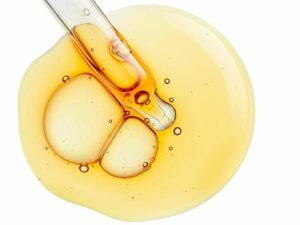
Benefits:
- Skin Renewal: This ingredient speeds up cell turnover, helping to remove dead skin cells that can give the skin a dull, tired appearance. The result is fresher, brighter, and more radiant skin.
- Improved Texture: According to Walgreens, retinol can be especially effective for treating skin conditions like acne scars and age spots. By accelerating cell turnover, it helps to even out skin texture and reduces the appearance of imperfections.
- Pore Size Reduction: Its exfoliating properties also mean that retinol can help unclog pores, which may appear smaller as a result. This is particularly beneficial for those with acne-prone or oily skin.
| Aspect |
Details |
Additional Information |
| Composition |
Derivative of vitamin A. |
One of the most researched and proven skincare ingredients. |
| Role in Skincare |
Acts as a powerful exfoliant. |
Encourages the shedding of outer, damaged skin layers to reveal fresher skin underneath. |
| Use in Products |
Included in anti-aging formulations and products to improve skin texture and tone. |
Known for its transformative effects on the skin. |
| Key Benefits |
– Skin Renewal: Speeds up cell turnover for fresher, brighter skin.
– Improved Texture: Treats conditions like acne scars and age spots.
– Pore Size Reduction: Helps unclog and reduce the appearance of pores. |
Regular use can lead to a more radiant and even complexion. |
| Notable Mention |
According to Walgreens, retinol is effective in treating skin imperfections. |
Its benefits extend beyond just anti-aging. |
Side Effects:
- Retinol can make your skin more susceptible to the UV radiation, requiring diligent use of sun protection.
- As retinol speeds up cell turnover, some users may experience flaking or peeling, which can be off-putting, though it often resolves as the skin adjusts to the product.
Integrating retinol into your product line offers a science-backed route to addressing various skin concerns, from aging to acne.
8. Enzymes
Enzymes in skincare are proteins that act as catalysts to facilitate specific biochemical reactions, often derived from fruits like papaya and pineapple. These enzymes work to break down the keratin protein in the upper layer of the skin, essentially digesting dead skin cells and other impurities. This makes them particularly useful as a gentle exfoliant in skincare formulations.

Benefits:
- Mild Exfoliation: Enzymes offer a milder alternative to other exfoliating agents like AHAs and BHAs. This makes them a popular choice in skincare lines of Nako Cosmetics for those with sensitive skin.
- Suitability for Sensitive Skin: Because of their gentle nature, enzymes are often suitable for those with sensitive or reactive skin types. They offer a way to achieve exfoliation without causing significant irritation or redness.
- Brightening Effect: The removal of dead skin cells allows for a more vibrant, refreshed appearance. The enzymatic action for instance reveals newer, healthier skin layers, contributing to a brighter complexion.
- Increased Ingredient Penetration: By removing the layer of dead skin cells, enzymes can enhance the skin’s absorption of other active ingredients in a skincare product, thereby boosting their effectiveness.

Side Effects:
- Some individuals may have allergic reactions to certain enzymes, especially those derived from fruits they are allergic to.
- Despite being milder, there is still the risk of over-exfoliation if used excessively or in combination with other exfoliating agents, leading to skin dryness and sensitivity.
The use of enzymes in skincare offers a nuanced approach to exfoliation and skin renewal, particularly appealing for sensitive skin types or for formulations aiming for gentle effectiveness.
9. Turmeric
Turmeric is a golden-yellow spice derived from the root of the Curcuma longa plant, native to Southeast Asia and India. It has been used for centuries in traditional medicine and cooking, and its active compound, curcumin, is lauded for its anti-inflammatory and antioxidant properties. Recently, it has gained prominence in skincare for its multiple skin benefits.

Benefits:
- Skin Brightening: The compound also has skin-brightening capabilities. It inhibits the production of melanin, which can lead to a reduction in dark spots and hyperpigmentation.
- Antioxidant Properties: Turmeric’s antioxidant effects help combat free radicals, providing a shield against environmental damage. This contributes to skin longevity and reduces signs of aging.
- Wound Healing: Several studies suggest that turmeric can accelerate the healing process of wounds and minor cuts. It does this by modulating collagen and decreasing inflammatory markers.

Side Effects:
- One of the most common issues with turmeric is that it can stain the skin a yellow or orange color, which may require multiple washes to remove.
- While generally safe, turmeric can cause skin irritation for some individuals, especially when used in high concentrations.
The incorporation of turmeric in skincare formulations can offer a holistic, natural approach to addressing various skin issues from inflammation to aging.
10. Green Tea Extract
Green tea extract is derived from the leaves of the Camellia sinensis plant and is a rich source of antioxidants, particularly epigallocatechin gallate (EGCG). This extract has been extensively studied for its health benefits, which extend to skincare due to its anti-inflammatory and antioxidant properties. It’s a frequent addition to skincare products aiming to address a variety of skin concerns, from aging to acne.
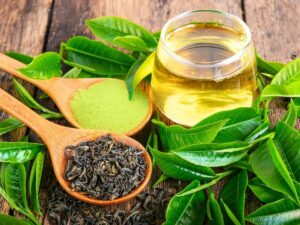
Benefits:
- Anti-Aging Benefits: Green tea extract is rich in antioxidants that combat the oxidative stress responsible for premature aging. It neutralizes free radicals and boosts skin health, contributing to a reduction in wrinkles and fine lines.
- Anti-Inflammatory Properties: The anti-inflammatory effects of green tea extract can reduce redness and inflammation. It is often used in products designed for sensitive or irritated skin, as well as for treating conditions like acne and rosacea.
- UV Protection: While not a substitute for sunscreen, green tea extract does offer some level of protection against UV radiation. Its antioxidant properties help to absorb UV rays, offering an added layer of defense against sun damage.
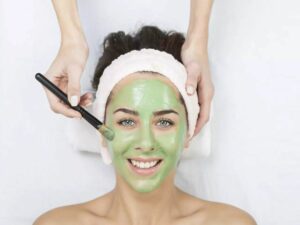
Side Effects:
- Though generally well-tolerated, green tea extract can cause irritation in some individuals, especially those with sensitive skin.
- Interactions with Medications: Green tea extract can interact with certain medications, particularly blood thinners, although this is typically more of a concern when consumed orally rather than applied topically.
The incorporation of green tea extract into skincare products provides a multi-faceted approach to skin wellness, with benefits ranging from anti-aging to UV protection.
Dive Deeper Into Our Resources
Looking for more diverse product options? Browse through our handpicked selections:
Still haven’t found what you’re looking for? Don’t hesitate to contact us. We’re available around the clock to assist you.
Conclusion
Navigating the complex landscape of skincare ingredients can be a daunting task for any brand aiming for excellence. This guide has distilled the science and benefits behind ten key ingredients for skin brightening, offering a robust foundation for product development.
For a more tailored consultation on how these potent ingredients can be integrated into your skincare line, consider partnering with Nako Cosmetic. Contact us to elevate your brand to the next level.

















